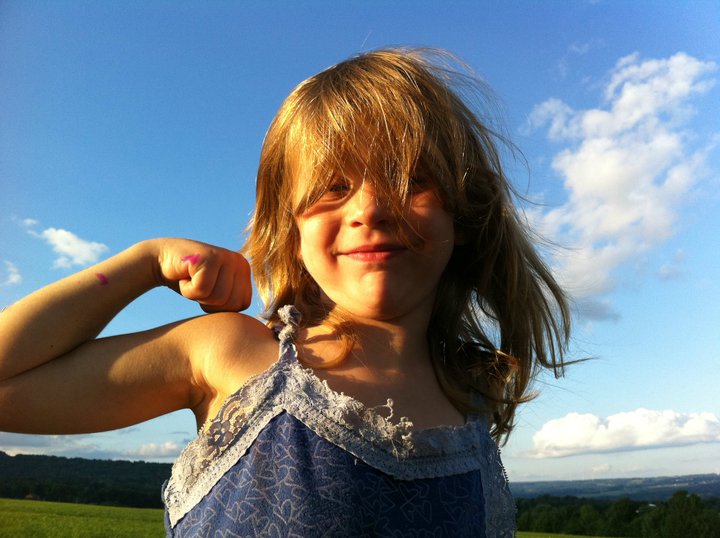I was a mother before I was a farmer. I had my first child just over 14 years ago, a few years before we moved to our farm. I was working in an office setting, on the 25th floor of a Boston-based financial firm. After having our first daughter, Harper, I enjoyed my six weeks maternity leave. I did what so many first-time moms do…try to get used to the idea of being someone’s mother! Well, that and attempt to figure out why the baby was so fussy… and why wouldn’t she sleep… or when would I lose the pregnancy weight… and why is it that liquid poo shoots up the back, rather than staying in the diaper??? Having my first child was indeed an earth-shattering event.
Margaret shows off her farm-girl muscles!
When my leave was over, I very begrudgingly went back to work. I loved my job at the time, but I had grown quite fond of this new creature in my life. Leaving her side seemed unthinkable. Leaving her with another human being to care for her while I was gone? Impossible! As I look back at it now, that was one of the few times in my life that I felt “trapped.” We were in no financial position for me to become a stay-at-home mom, nor was I really sure that’s what I wanted. In the end, it was the fact that I had no choice but to return to work that proved so difficult for me. I felt trapped—and I didn’t like it.
So then, when people ask me what I want for my own children, I almost always immediately answer: That they have choices. I don’t want them to ever feel trapped, be it in their career, education or personal lives. I don’t want my daughters to be constrained by what someone else thinks they can or cannot do. I want them to realize their full potential, whatever that may be.
It sounds deceivingly simple, but having the freedom to choose one’s own path takes a great deal of planning and preparation. True freedom of choice comes from getting a good education, from exposing oneself to a vast world of possibilities. It’s one of the greatest reasons I never desired to homeschool my girls—I feared I would limit them to my worldview. Quite the contrary, I want my daughters to have their beliefs challenged—even if they are beliefs I share; to engage in and not run from discussion or dissenting opinion. I want them to hear voices different from their own, to meet people they never knew existed. I want them to always be inquiring, to at all times be curious about their surroundings. No matter what path in life they choose, my girls will always find a world of opportunity if they maintain a sense of curiosity and open-mindedness.
With freedom of choice, of course, comes tremendous responsibility. I want them to understand the consequences of their choices, and that every choice they make affects someone or something else.
It’s funny, but this is exactly how I feel about farming. As a farmer, having choices is very important to me: I need to have the freedom to make choices about how I farm. I’ve seriously considered on multiple occasions different farm certifications including organic, Animal Welfare Approved, even a “farmer’s pledge,” but none of them quite fit, and all of them constrained my freedom to make the right choices for my farm. In some cases, such as organic, I would not be allowed to use antibiotics to save an animal’s life and still keep her as a productive member of the farm. In the case of Animal Welfare Approved, I was disappointed to hear they did not like a particular breed of chicken, despite the fact that commercial animal breeds are continuously being improved. Although all of these certifications aimed to identify “best practices” and communicate information that the consumer indeed wants, they are all ultimately marketing tools aimed at selling product. None of them specifically allow for learning, flexibility and adaptation on the part of the farmer.
Believe it or not, a farmer is constantly faced with having her beliefs challenged. Indeed, there is little room for ideology in farming; the farmer either adapts her methods to real-world and often changeable conditions or the business suffers the consequences. I have yet to find “one right way” to farm, which makes it pretty darn exciting. I honestly enjoy being confronted with new information or observations that cause me to re-evaluate my business plan or my approach to animal care. My own sense of curiosity has been rekindled by becoming a farmer and I am excited about the potential of new research coming out all the time. It’s a cool time to be in agriculture!
As I said before, I believe that freedom of choice carries tremendous responsibility. As a farmer, I want to understand the consequences of my choices, and am always looking for ways to improve upon “best practices”—a bar that is continually moving up. Even more importantly, farmers will be faced with feeding two billion more people in the next 30 years. The farmers of tomorrow will be challenged with growing enough food in a changing climate—with the same or even fewer resources. It won’t be easy!
I left that financial firm when Harper was almost three, to move to a farm and try to get used to the idea of being a farmer. That in itself has been a long process, but it has opened a whole new world for me. I had my second daughter ten years ago. I am happy to say I didn’t feel trapped; I didn’t feel stressed. It helped that Margaret seemed to be a much easier baby, but I was a different mother, with seemingly infinite choices in front of me. I hope they have a world of choices in front of them, too.
